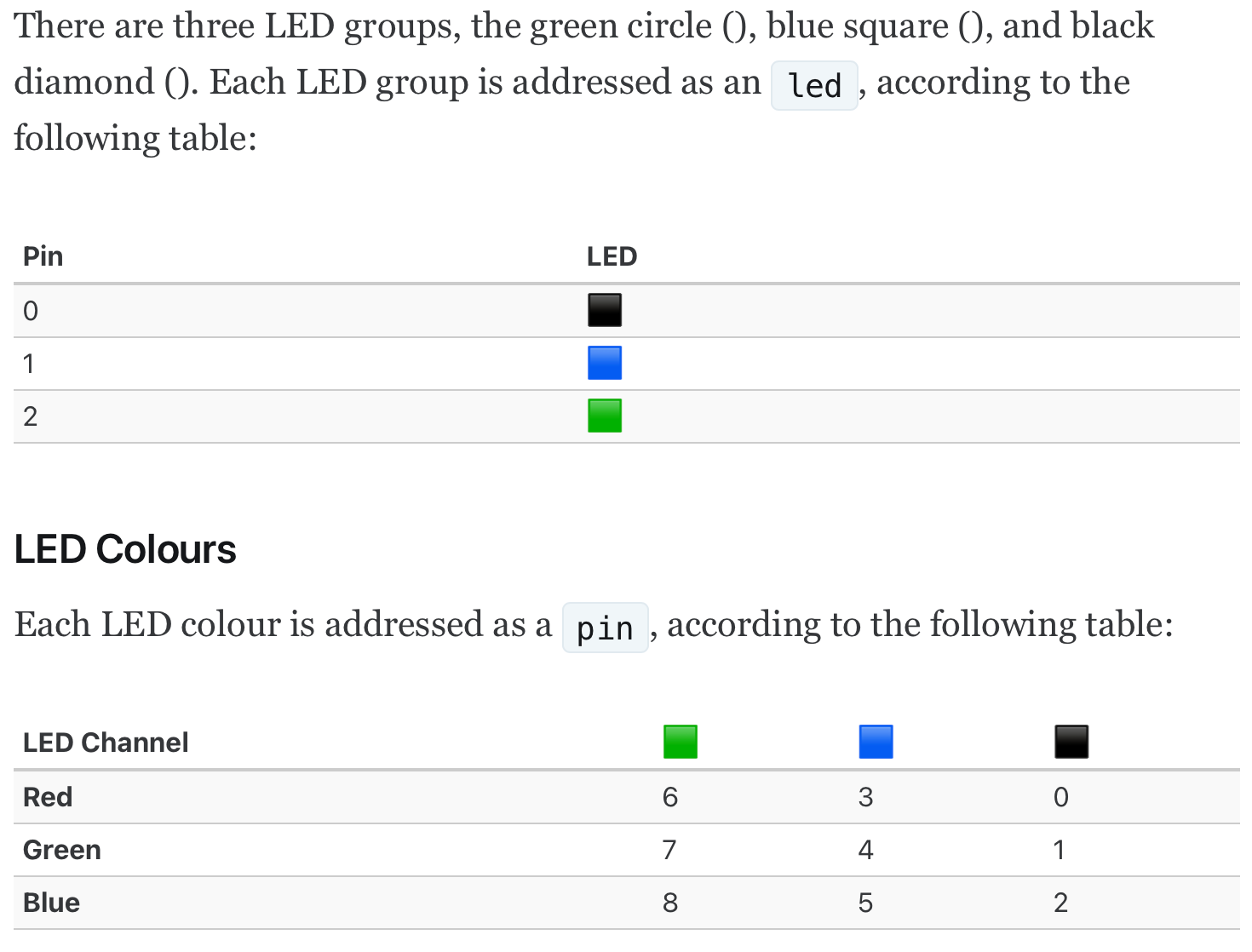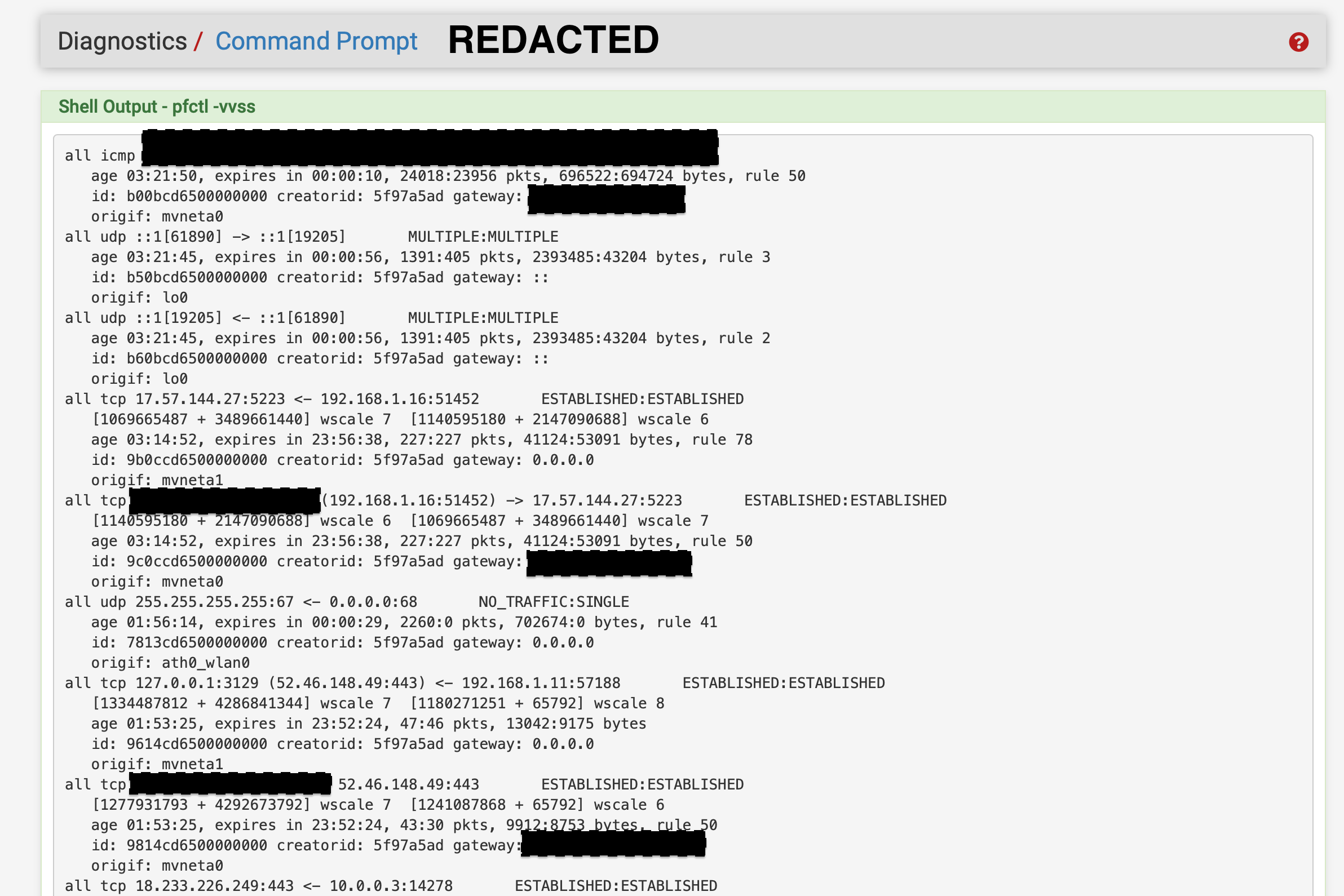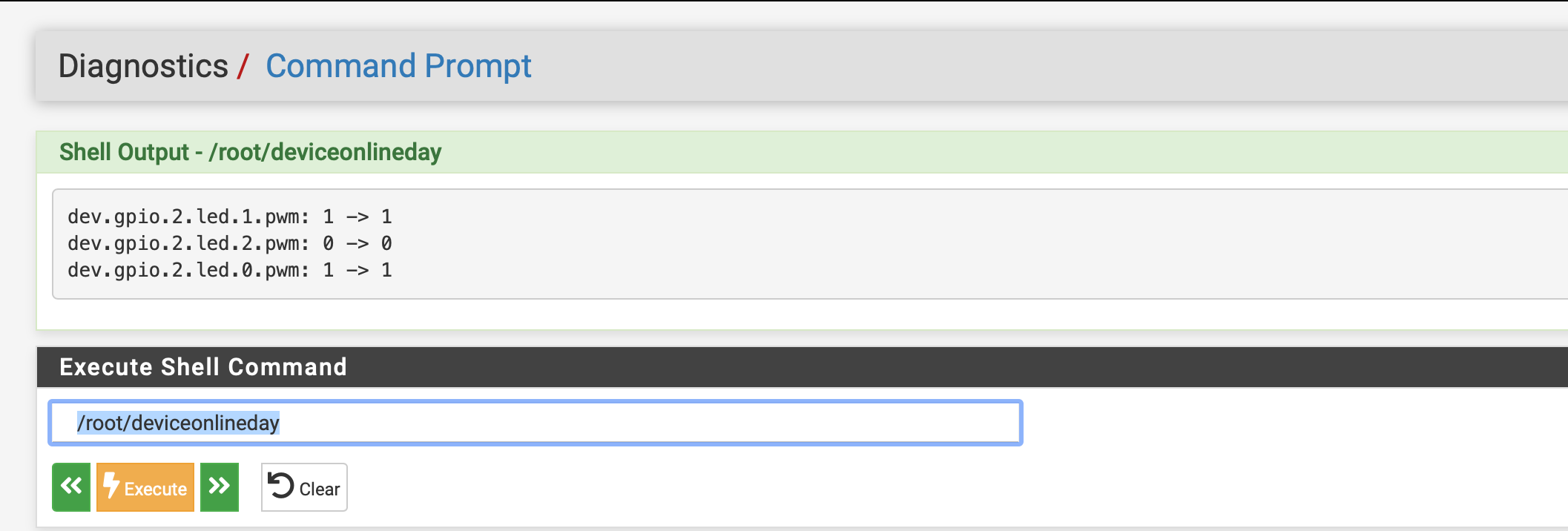Netgate 2100 Customization of LEDs (Guide)
-
Photos Restored Jan 28 23:36
-
 J JonathanLee referenced this topic on
J JonathanLee referenced this topic on
-
 J JonathanLee referenced this topic on
J JonathanLee referenced this topic on
-
I’m trying to figure out how I can modify this to work with system status? Specifically I would like to set all the led’s on my 4200 to bright red when the wan gateway is down. Not finding a bash script to do this though.
-
You can.. all you would have to do is find some WAN connection you can use with a variable with pfctl -vsss
maybe just search for any WAN connections if you have a static IP it would be the best just search for that IP address with.So really basic "if else" it could be..
if-->
WAN not found
turn LEDs RED!!!
else-->
turn LEDS off or GREENuse this command in shell to find something that would work...
pfctl -vvssTo make all the LEDS red on 2100 is...
sysctl -q dev.gpio.2.led.0.pwm=0 gpioctl -f /dev/gpioc2 0 duty 200 >/dev/null sysctl -q dev.gpio.2.led.1.pwm=0 gpioctl -f /dev/gpioc2 3 duty 200 >/dev/null sysctl -q dev.gpio.2.led.2.pwm=0 gpioctl -f /dev/gpioc2 6 duty 200 >/dev/nullSo basically ...
#!/bin/sh check_current_states=$( pfctl -vvss | grep -e ‘STATIC WAN IP ADDRESS HERE’ ) WAN=1 case "$check_current_states" in *WAN IP* ) WAN=1 ;; esac if [ $WAN = 0 ]; #meaning if it is offline turn them to red then sysctl -q dev.gpio.2.led.0.pwm=0 gpioctl -f /dev/gpioc2 0 duty 200 >/dev/null sysctl -q dev.gpio.2.led.1.pwm=0 gpioctl -f /dev/gpioc2 3 duty 200 >/dev/null sysctl -q dev.gpio.2.led.2.pwm=0 gpioctl -f /dev/gpioc2 6 duty 200 >/dev/null else #turn all LEDs off or what ever you need.... sysctl -q dev.gpio.2.led.0.pwm=1 gpioctl -f /dev/gpioc2 0 duty 0 >/dev/null gpioctl -f /dev/gpioc2 1 duty 0 >/dev/null gpioctl -f /dev/gpioc2 2 duty 0 >/dev/null sysctl -q dev.gpio.2.led.1.pwm=1 gpioctl -f /dev/gpioc2 3 duty 0 >/dev/null gpioctl -f /dev/gpioc2 4 duty 0 >/dev/null gpioctl -f /dev/gpioc2 5 duty 0 >/dev/null sysctl -q dev.gpio.2.led.2.pwm=1 gpioctl -f /dev/gpioc2 6 duty 0 >/dev/null gpioctl -f /dev/gpioc2 7 duty 0 >/dev/null gpioctl -f /dev/gpioc2 8 duty 0 >/dev/null fiOr for the else condition you could set it to green if WAN is online
sysctl -q dev.gpio.2.led.1.pwm=1 gpioctl -f /dev/gpioc2 3 duty 0 >/dev/null gpioctl -f /dev/gpioc2 4 duty 0 >/dev/null sysctl -q dev.gpio.2.led.2.pwm=1 gpioctl -f /dev/gpioc2 6 duty 0 >/dev/null gpioctl -f /dev/gpioc2 7 duty 50 >/dev/null gpioctl -f /dev/gpioc2 8 duty 0 >/dev/nullMake a cron job to run the scrip every so often to check...
keep in mind you would have to also disable the current LEDS too
sysctl -q dev.gpio.2.led.0.pwm=1 gpioctl -f /dev/gpioc2 0 duty 0 >/dev/null gpioctl -f /dev/gpioc2 1 duty 0 >/dev/null gpioctl -f /dev/gpioc2 2 duty 0 >/dev/null sysctl -q dev.gpio.2.led.1.pwm=1 gpioctl -f /dev/gpioc2 3 duty 0 >/dev/null gpioctl -f /dev/gpioc2 4 duty 0 >/dev/null gpioctl -f /dev/gpioc2 5 duty 0 >/dev/null sysctl -q dev.gpio.2.led.2.pwm=1 gpioctl -f /dev/gpioc2 6 duty 0 >/dev/null gpioctl -f /dev/gpioc2 7 duty 0 >/dev/null gpioctl -f /dev/gpioc2 8 duty 0 >/dev/nullor just create a while loop to do that..
-
Side Note:
if your 4200 has lots of traffic... I am talking thousands of clients... running pfctl over and over every minute might not be for you,, as it takes up some memory when you do this..
However for a small office or a dozen or so clients this is no big deal....
-
@JonathanLee
So I could just use something like 8.8.8.8 for the static WAN? -
@wgstarks That's the DNS yes if the gateway went offline I am sure that state would no longer exist. Try that unplug wan for 10 mins see if it glows red plug it v=back in wait ten mins see if it normalizes. Great idea
-
@JonathanLee
Do you know what the factory default is for the “or else”? -
I think it is very close too..
sysctl -q dev.gpio.2.led.2.pwm=0 gpioctl -f /dev/gpioc2 8 duty 30 >/dev/nullit pulses blue like that... I never used the default once I went to custom blinking light mode
Remember you have to disable the others before you change it back with
sysctl -q dev.gpio.2.led.0.pwm=1 gpioctl -f /dev/gpioc2 0 duty 0 >/dev/null gpioctl -f /dev/gpioc2 1 duty 0 >/dev/null gpioctl -f /dev/gpioc2 2 duty 0 >/dev/null sysctl -q dev.gpio.2.led.1.pwm=1 gpioctl -f /dev/gpioc2 3 duty 0 >/dev/null gpioctl -f /dev/gpioc2 4 duty 0 >/dev/null gpioctl -f /dev/gpioc2 5 duty 0 >/dev/null sysctl -q dev.gpio.2.led.2.pwm=1 gpioctl -f /dev/gpioc2 6 duty 0 >/dev/null gpioctl -f /dev/gpioc2 7 duty 0 >/dev/null gpioctl -f /dev/gpioc2 8 duty 0 >/dev/nullThis would be like a reset turns them all off..
-
@JonathanLee
Thanks. Might be simpler to just set it to red and green. I never remember what the default patterns mean anyway.
-
@wgstarks One other item with the custom LEDs you will not see the firmware LED program run so I added a email alert for updates program with it that another user shared on Netgate...
https://forum.netgate.com/topic/137707/auto-update-check-checks-for-updates-to-base-system-packages-and-sends-email-alerts/
That way you still get a alert that you have updates without the Orange LED
-
Thanks. Have had that installed for a while.
-
 J JonathanLee referenced this topic on
J JonathanLee referenced this topic on
-
@stephenw10 Can you please help me?
Where is the standard led program in pfSense filesystem located it would be easier to just call that program if the gateway is up for @wgstarks request. He wants to normalize the LED behavior if the gateway is up. I could just set the scrip to call that program if needed. /dev/led is not listed in 2100 file system -
To normalize it call this program originally sets bootup conditions, I am searching for the file it calls
/usr/local/sbin/pfSense-led.sh
-
set the program to call
/usr/local/sbin/pfSense-led.sh readyUse that for the else condition that would normalize it automatically for your model
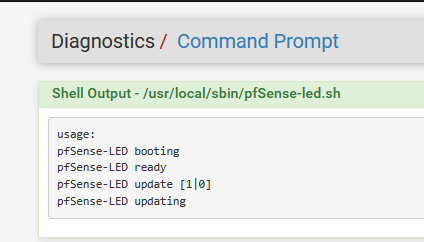
-
Thanks. I’ll test this and see if I can get it working.
-
This post is deleted! -
I got it don't use DNS use the interfaces name and pinger
pfctl -vvss | grep -e "mvneta0 icmp"
that works!!!
#!/bin/sh led_intensity=0 while [ $led_intensity -le 8 ]; do gpioctl -f /dev/gpioc2 $led_intensity duty 0 >/dev/null led_intensity=$(( led_intensity + 1 )) done check_current_states=$( pfctl -vvss | grep -e "mvneta0 icmp" ) WAN=0 case "$check_current_states" in *icmp* ) WAN=1 ;; esac if [ $WAN = 0 ]; then sysctl -q dev.gpio.2.led.0.pwm=0 gpioctl -f /dev/gpioc2 0 duty 200 >/dev/null sysctl -q dev.gpio.2.led.1.pwm=0 gpioctl -f /dev/gpioc2 3 duty 200 >/dev/null sysctl -q dev.gpio.2.led.2.pwm=0 gpioctl -f /dev/gpioc2 6 duty 200 >/dev/null else /usr/local/sbin/pfSense-led.sh ready fi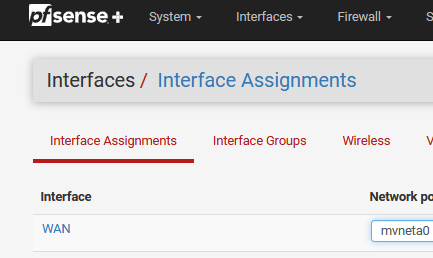
Your mvneta0 might be different over the 2100 check it on Interface Assignments, that is the pinger state used to check to see if gateway is up just use it for the program also
YEAH!!
Just updated after testing 4:07 7-18-24
-
Update to mine to reflect the gateway offline
#!/bin/sh check_current_states=$( pfctl -vvss | grep -e ', rule 105' -e ', rule 52' -e '192.168.1.11' -e '192.168.1.15' -e 'mvneta0 icmp' ) res=1 resb=1 resc=1 resd=1 WAN=1 case "$check_current_states" in *icmp* ) WAN=0 ;; esac if [ $WAN = 1 ]; then sysctl -q dev.gpio.2.led.0.pwm=0 gpioctl -f /dev/gpioc2 0 duty 200 >/dev/null sysctl -q dev.gpio.2.led.1.pwm=0 gpioctl -f /dev/gpioc2 3 duty 200 >/dev/null sysctl -q dev.gpio.2.led.2.pwm=0 gpioctl -f /dev/gpioc2 6 duty 200 >/dev/null exit 1 fi case "$check_current_states" in *", rule 105"* ) res=0 ;; esac case "$check_current_states" in *192.168.1.11* ) resb=0 ;; esac case "$check_current_states" in *192.168.1.15* ) resc=0 ;; esac case "$check_current_states" in *", rule 52"* ) resd=0 ;; esac if [ $res = 0 ] && [ $resb = 0 ]; then sysctl -q dev.gpio.2.led.1.pwm=1 gpioctl -f /dev/gpioc2 3 duty 50 >/dev/null gpioctl -f /dev/gpioc2 4 duty 15 >/dev/null sysctl -q dev.gpio.2.led.2.pwm=0 gpioctl -f /dev/gpioc2 6 duty 55 >/dev/null gpioctl -f /dev/gpioc2 7 duty 20 >/dev/null gpioctl -f /dev/gpioc2 8 duty 15 >/dev/null elif [ $res = 0 ]; then sysctl -q dev.gpio.2.led.1.pwm=1 gpioctl -f /dev/gpioc2 3 duty 0 >/dev/null gpioctl -f /dev/gpioc2 4 duty 0 >/dev/null sysctl -q dev.gpio.2.led.2.pwm=0 gpioctl -f /dev/gpioc2 6 duty 55 >/dev/null gpioctl -f /dev/gpioc2 7 duty 20 >/dev/null gpioctl -f /dev/gpioc2 8 duty 15 >/dev/null elif [ $resb = 0 ]; then sysctl -q dev.gpio.2.led.2.pwm=1 gpioctl -f /dev/gpioc2 6 duty 0 >/dev/null gpioctl -f /dev/gpioc2 7 duty 0 >/dev/null gpioctl -f /dev/gpioc2 8 duty 0 >/dev/null sysctl -q dev.gpio.2.led.1.pwm=1 gpioctl -f /dev/gpioc2 3 duty 50 >/dev/null gpioctl -f /dev/gpioc2 4 duty 15 >/dev/null else sysctl -q dev.gpio.2.led.1.pwm=1 gpioctl -f /dev/gpioc2 3 duty 0 >/dev/null gpioctl -f /dev/gpioc2 4 duty 0 >/dev/null sysctl -q dev.gpio.2.led.2.pwm=1 gpioctl -f /dev/gpioc2 6 duty 0 >/dev/null gpioctl -f /dev/gpioc2 7 duty 50 >/dev/null gpioctl -f /dev/gpioc2 8 duty 0 >/dev/null fi if [ $resc = 0 ] || [ $resd = 0 ]; then sysctl -q dev.gpio.2.led.0.pwm=1 gpioctl -f /dev/gpioc2 2 duty 50 >/dev/null gpioctl -f /dev/gpioc2 0 duty 50 >/dev/null else sysctl -q dev.gpio.2.led.0.pwm=1 gpioctl -f /dev/gpioc2 2 duty 0 >/dev/null gpioctl -f /dev/gpioc2 0 duty 0 >/dev/null fi -
When I test in shell I get the following result-
gpio_open: No such file or directory gpio_open: No such file or directory gpio_open: No such file or directory gpio_open: No such file or directory gpio_open: No such file or directory gpio_open: No such file or directory gpio_open: No such file or directory gpio_open: No such file or directory gpio_open: No such file or directoryMy script-
#!/bin/sh led_intensity=0 while [ $led_intensity -le 8 ]; do gpioctl -f /dev/gpioc2 $led_intensity duty 0 >/dev/null led_intensity=$(( led_intensity + 1 )) done check_current_states=$( pfctl -vvss | grep -e "igc3 icmp" ) WAN=0 case "$check_current_states" in *icmp* ) WAN=1 ;; esac if [ $WAN = 0 ]; then sysctl -q dev.gpio.2.led.0.pwm=0 gpioctl -f /dev/gpioc2 0 duty 200 >/dev/null sysctl -q dev.gpio.2.led.1.pwm=0 gpioctl -f /dev/gpioc2 3 duty 200 >/dev/null sysctl -q dev.gpio.2.led.2.pwm=0 gpioctl -f /dev/gpioc2 6 duty 200 >/dev/null else /usr/local/sbin/pfSense-led.sh ready fi -
Do me a favor take a look in
/usr/local/sbin/pfSense-led.shFind your model firewall and tell me what directive is used to change the LEDS…
Also peek in /dev/led see if you have that folder, if you do it should be easy to adapt with the directive used for your model


